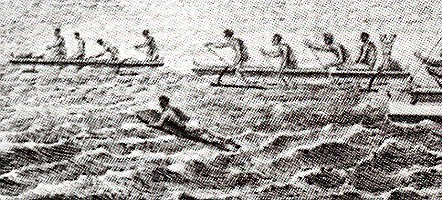pods
for primates : a catalogue of surfboards in australia since 1900
 |
surfresearch.com.au
the
catalogue #172 |
|
| 1930
Solid Wood Belly Board
4ft 5 1/2" |
#172
|

MANUFACTURE
MANUFACTURER:
Unknown
SHAPER:
Unknown
DESIGN:
Paipo/Belly
Board/Lamaroo
DESIGNER:
Unknown
SPECIFICATIONS
CONSTRUCTION
Redwood ?
board, natural timber. Probably stained, possibly varnished.
DIMENSIONS
|
Length :
|
4
|
ft |
5 1/2
|
inches |
|
|
|
Width :
|
15 1/4
|
inches |
|
Nose @ :
|
6 |
inches |
|
Width :
|
8 1/2
|
inches |
|
Tail @ :
|
4 |
inches |
|
Thickness :
|
3/4
|
inches |
|
Pod :
|
n/a |
inches |
|
Nose Lift :
|
|
inches |
|
Tail Lift :
|
|
inches |
|
Weight :
|
|
kilos |
|
Volume :
|
|
litres |
|
Other, Flyer/s :
|
|
inches |
|
|
|
|
FEATURES
Nose:
round
Tail:
round
Deck:
flat
Bottom:
flat
Rails:
rounded square
Rocker:
flat
FIN/S:
none
DECOR
DECALS:
Deck:
none
Bottom:
MARKINGS
Deck:
none
Bottom:
COLOUR
Deck:
natural timber. Probably stained, possibly varnished.
Bottom:
NOTES
BOARD HISTORY
Dimensions and photographs
Sydney Surf Auction, Mona Vale Hotel, Sydney, 19 October 2002
Catalogue No. 162
Notes by Mick Mock
Insert Comments
here.
DESIGN HISTORY
Circa 400, the Paipo
developed as small wooden prone board, used thoughout the
Pacific Islands primarily as juvenile sport. In Tahiti and Hawaii the boards
were ridden prone, kneeling and, occassionally, standing.
Other Pacific Islands were restricted
to prone riding only.
The origin of these boards is speculative,
but broken sections from discarded canoes, outrigger floats or paddles
(the blades) are possible sources.
Dimensions ranged from 3 feet x 12 inches
(the smallest example in the Bishop Museum, Honolulu.
Catalogue Number :C.5966) to 6 feet x
9 inch boards in Aotearoa (New Zealand).
 |
Paipo Board and Paddler
Detail from ...
Cook at Kealakekua Bay
Engraving from a sketch made in 1778.
(Bishop Museum)
Finney
and Houston, page 12.
|
With the development of an
adult surfing culture, prone boards became essential in acquiring
basic surf skills. In the 20th century, the Paipo has been re-invented
several times...
The most successful (in sales, performance
and safety) is Tom Morey's Booggie
Board, 1971.

|

|
Paipo and Surfer, Wakiki circa
1900
Lueras,
page 55
(Bishop Museum)
|
Prone boards and juvenile surfers
Joe and Jack Quigg, 1932
Severson
page 20 (Cropped)
|
Solid
timber handboards/bellyboards were in use on Sydney's beaches before the
visit of Duke Kahanamoku in 1914 - see History/Duke/Detailed
Analysis.
The enthusiasm generated
by this visit saw Sydney surfers persue the developement of the standing
board and prone craft were dominated by the Surf-o-plane, circa 1933.
These boards were
in Victorian use as early as 1915, by a Mr. Jackson and Mr. Goldie at Point
Lonsdale, after a visit to Hawaii.
They were either
imported or homemade adaptations and in 1915 they encouraged a local girl,
Grace
Smith Wootton, to take up the sport.
Plans of solid timber prone boards were
pulished in Popular
Mechanics magazine July 1934 and
Popular
Science magazine August 1935.
These illustrated that such boards were
already in use in the USA and
publication in such magazines probably saw these plans distrubuted world
wide.
The design was popular
in the southern states of Australia and in New
Zealand, South Africa
and UK. Although many were
probably home made, this and several New Zealand examples were probably
factory made - note regular shape, nose lift and paint decor.
REFERENCES
Other Boards
Surfworld Museum,
Torquay Victoria. : Lamaroo # 26
ANMN #00005796 1934-1940 Bellyboard
3’9" x 26" See Notes on ANMM Collection
Also see Paipo
Catalogue
Books
Wells
pages
157 - 159
Edmunson
pages157
- 167, note Figures 51 and 52.
CONDITION:
8.5



 |
Prout brand solid wood belly board,
New Zealand 1940's 5ft
Longboard Surfshop (NZ) On-line Auction
catalogue, 1999. |

Boy with bellyboard, UK circa 1960
Edmunson
; page 162
Text reports dimensions as 4 ft x 12''
x 3/8''
Waterproof resin-bonded or marine plywood.
Commercially available,
cost up to 30 shillings ($3.00)
|

Grace Smith Wooton and Win Harrison
Point Lonsdale Victoria, circa 1916.
Wells
page
157
The board was made
by a local carpenter,
cost 12 shillings
($1.20),
with her initials
carved in one end.
|

Lamaroos at Phillip Island, Victoria 1935.
Note that two boards to the left appear
to be laminated sections.
from Two
Hundred Years, No. 47 page 1124

Prone Timber Boards and Surfers,
West Coast, USA circa 1905
Photograph : Mike Jipp / Lincon City Surf
Shop Collection
Kampion
: The Way of the Surfer, 2003
pages 18 - 19.

Timber prone boards, Durban,
South Africa circa 1950.
Postcard

surfresearch.com.au
Builders from the Register of Australian and New Zealand Vessels
by Mori Flapan
http://www.boatregister.net/TasmanianBuilders.htm
Risby Bros
Years Active: 1848-1894
Where Built: Hobart, Tas
Number of Vessels: 2
Material: Wood
Type of vessels: Cargo schooner, cargo ketch
Names of vessels: Spy, Nellie
People of Hobart: Mid to late 1860s
http://members.tadaust.org.au/bobcutter/hobartres.html#R
RISBY Joseph E. timber merchant¸ 2 Elizabeth Street
Glenorchy History Group
http://www.tco.asn.au/oac/community_groups.cgi/community_groups.cgi?groupID=5364&oacID=68
Sawmills, whaleboat building and racing.
Contact
The Glenorchy History Group Inc
Garry John Fisher (Secretary or Public Officer)
134 Howard Road Goodwood Tasmania 7010
Postal Address:
134 Howard Road Goodwood Tasmania 7010
Municipality:
Glenorchy City Council
Ph: (03) 6272-1998
Email:
p.butler@internode.on.net
Maritime Museum of Tasmania
http://www.maritimetas.org/
Sporting Island -- A History of Sport and Recreation
in Tasmania
http://www.bicentenary.tas.gov.au/events/event.php?id=237
The book, Sporting Island, by David Young highlights important events,
activities and people who have influenced and contributed to the development
of sport and recreation and helped shape the Tasmanian community in which
we live. The book will provide a background to Tasmania's sporting and
recreation heritage and enable Tasmanians to understand their sporting
and recreational cultural.
David Montgomery Chiropractic Clinic
413a Sydney Road
Balgowlah NSW 2093
02 9949 2315













